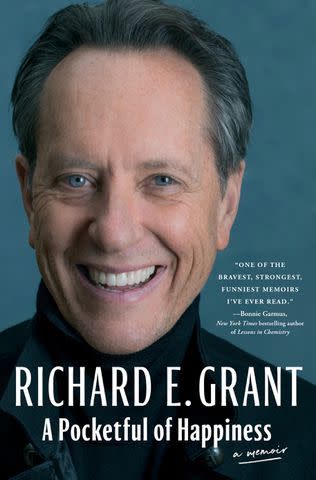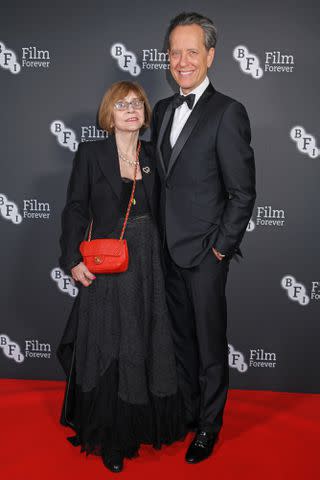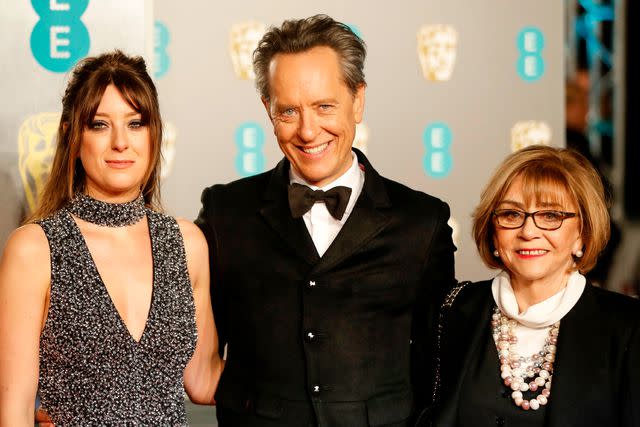Oscar Nominee Richard E. Grant Says Grief After His Wife’s Death Is ‘A Kind of Abyss’ (Exclusive)
- Oops!Something went wrong.Please try again later.
‘Can You Ever Forgive Me?’ star Richard E. Grant mourns his late wife, Hollywood dialect coach Joan Washington, in the new memoir ‘A Pocketful of Happiness’

Jeff Spicer/Getty
Richard E. GrantRichard E. Grant may be known for the sardonic wit he brings to the screen in his breakout Withnail and I, Oscar-nominated Can You Ever Forgive Me? and beyond. Or perhaps for his well-documented adoration of Barbra Streisand — expertise in “the lexicon of Streisandia,” as he tells PEOPLE. But as his newly released A Pocketful of Happiness can attest, the 66-year-old actor is also a gifted memoirist.
More accurately, given that the book is a collection of journal entries curated from different eras of his life, Grant is a diarist. Born in the British protectorate of Swaziland (now an independent country known as Eswatini) he began writing, as he says in the prologue to A Pocketful of Happiness, at age 10 “after waking up on the back seat of a car to witness my mother bonking my father’s best friend on the front seat in 1967.”
On U.S. bookshelves August 1, the revealing memoir flits back and forth between Grant’s run-ins with celebrities (Jennifer Aniston, the Spice Girls, even Donald Trump) and the terminal illness that in 2021 resulted in the loss of Joan Washington, his beloved wife of 38 years. Survived by Grant, their daughter Olivia, and a stepson, Tom, from Washington's previous relationship, she was revered by the A-list actors who worked with her, as evidenced by the touching collection of tributes at the end of A Pocketful of Happiness. (Its title was inspired by advice Washington gave after her cancer diagnosis: "to try and find a pocketful of happiness each day.") Grant opens up to PEOPLE about his experience with grief and why joy is an integral part of the process.

Courtesy of Simon and Schuster
A Pocketful of Happiness by Richard E. GrantI’d like to first say I’m sorry for your loss, but grateful for your willingness to talk about it, both in this book and here. Is it strange to discuss the passing of your wife in interviews like this one?
Richard E. Grant: No, because when I published the book [in the United Kingdom, I] then did a one-man show based on it, touring Australia and New Zealand and all around the United Kingdom and Denmark and Scotland and Ireland. I got so in the habit of talking for an hour about the whole experience, that I suppose I got used to it. And I found it very cathartic and very helpful.
The other thing is that in my experience — and it's certainly a very western phenomenon that has chimed with many, many people that I have met or who have written to me or contacted me via social media — people either won't talk about the person who's died or they won't acknowledge that the person died. So the effect on the person who is bereaved is that you feel like the person who's died has been either canceled or never existed. And what you want more than anything is to be able to talk about them! So, this book has proved to be a catalyst for that.

David M. Benett/Getty
Joan Washington and Richard E. Grant in 2019They say that in writing a book, you know so much more about how to do the writing at the end of the process than at the beginning. How does that apply to, in this case, a collection of journals that covers the trajectory of the passing of a loved one?
Well, because I kept a diary since I was 10 years old… the habit of writing is lifelong. And when I was asked by publishers to write about this after posting a video on social media on New Year's Day, saying I felt like a turtle that had lost its shell, and that the death of my wife was like my cup was being broken up. It got such an extraordinary response that then publishers came forward and said, “Would you write a book about this?” And I said, unequivocally, I wouldn't.
And my daughter said, “I think that if you seesaw backwards and forwards in time, how you first met your wife and intertwine your combined careers and stories with that, then it's not just a death memoir — because of your 38 years together, it was only those last eight months that were dominated by illness.” So I did that on the proviso that if my daughter vetoed all of it, I wouldn't publish a word. And so because she gave her endorsement of it, I then felt that it would be a record of our lives together. So I'm very grateful for that.
Related: Richard E. Grant Remembers Late Wife on Her Birthday: 'I Miss Her More Than Is Measurable'
And how are you doing now? Where are you and your daughter in that grieving journey?
You know, it's a daily navigation because it's a kind of abyss, the grief. I don't know that you ever get over it. You go around it, you have to navigate your way around it. And there are days when you just get tsunami'ed by it. There's no rhyme or reason, but you suddenly get hit by it. And both of us have just supported each other and just having to accept that this is what happens and try and go forward. And because my wife gave us this dictum four days before she died, “to try and find a pocketful of happiness in each day,” that has been such a great mantra by which to live. So that rather than you've gotta win the Nobel Prize or lottery or some great event which is never gonna happen, be mindful, and find happiness and joy in smaller things on a daily basis. And of course, it has built in that phrase, a license to be happy and not to live your life and feel guilt if you do feel joyful.
Never miss a story — sign up for PEOPLE's free daily newsletter to stay up-to-date on the best of what PEOPLE has to offer, from juicy celebrity news to compelling human interest stories.

TOLGA AKMEN/AFP via Getty
Olivia Grant, Richard E. Grant and Joan WashingtonA Pocketful of Happiness has plenty of joy, especially when chronicling your run-ins with celebrities. In general, how does pop culture or its artists help distract you or heal from difficult times?
Watching stuff on TV or streaming or going to the movies or going to the theater is a great way of escaping into another world and it gives you respite from it. So I'm profoundly grateful for that. And books.
Are there any celebrity meetings that didn't make it into the book?
[Laughs] Because we’ve been in show business for decades, and my wife worked as an accent coach for A-list actors for the last 40 years, we got messages and calls and visits from a bigger list than is in there. But the editor said that, “I think that we have to edit them down because it starts just to [be a] kind of roll call of, ah, the glitterati. And you can alienate people from that way.” And I said, “Well, these are the people that we happen to know and are friends with!” And she said, “Well, let's ameliorate that.”
With @melissamccarthy and @RichardEGrant at the Oscars last night. ❤️ pic.twitter.com/IjWlDvtg5U
— Barbra Streisand (@BarbraStreisand) February 25, 2019
We have to ask you about Barbra Streisand of course. Is there an underrated factoid or aspect of her career that you can't believe more people don't know about?
I don't know, but in her beautiful letter that she sent me just the month before Joan died, she did say, “So far you are the only person that I know of who has a statue of me.” So I was so thrilled to hear this. I have created something that nobody else has done, you know, in the lexicon of Streisandia.
Lastly, what is your artistic mission? Your overall goal as a creative person?
To be as honest as I possibly can. Warts and all. And, you know, that's absolutely in my writing. There's no censorship whatsoever because I firmly and profoundly believe that secrets are toxic. And I know, to my own cost, to my family, what that is. And if you are honest in your art, then you reach people and people respond. They sniff out inauthenticity a mile off.
For more People news, make sure to sign up for our newsletter!
Read the original article on People.

